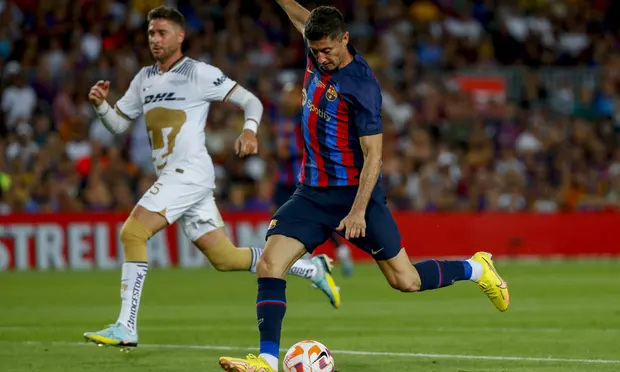Barcelona was blocked by La Liga from registering new players before the season
Barcelona was blocked by La Liga: The attempt by Barcelona to utilize the club’s own cash to inflate the worth of two of the asset sales they had resorted to in order to balance their books and enhance their team was denied by La Liga. As a result, Barcelona is still unable to register any of its summer additions.
The intention now is to turn to the fourth source of extraordinary income with the sale of a further 25 percent of their content production company, Barca Studios, for an estimated amount of €100 million.
So, in the hope that it will allow them to include new arrivals such as Robert Lewandowski, Andreas Christensen, and Jules Koundé in the squad for their opening game against Rayo Vallecano on Saturday night. This will be done in the hope that it will allow them to include new arrivals such as Robert.
Finance
Barcelona had believed that by accounting for advantages of €667 million (£562 million) from the sale of two packages of future broadcast rights, they would be able to comply with the financial fair play rules that are enforced by La Liga. In addition to that, they made the announcement that they had sold a little under 25 percent of Barca Studios. This was the third of the so-called “palancas” or economic “levers” that they had utilized this summer.
In total, Barcelona stated that they had brought in more than €850 million as they seek to improve their team and fix a financial crisis. This figure includes a new sponsorship deal with Spotify, the departure of players, and increased revenue. In addition, Barcelona stated that they had brought in more than €850 million.
However, the investigation conducted by the league discovered that the amount Barcelona had directly received from investors Sixth Street for two TV rights packages of 10 percent and 15 percent respectively was only 517 million euros.
Cope
According to Cadena Cope, the remaining 150 million euros had been paid for by the club itself. This information was provided by the Spanish radio station. The transaction may be completed legally, as confirmed by Grant Thornton, the club’s auditors; nonetheless, the league has recalculated the profit based on the assumption that €150 million of the total amount is not fresh income.
Due to the fact that they have spent more money than any other club in Spain on player transfers and have not yet been able to cut their pay outgoings by an adequate amount, Barcelona is still below the level that would allow them to register all of their players with La Liga.
According to what Cope said, rather than offer those items to Sixth Street directly, Barcelona established a business company called Locksley Investments. This corporation made a long-term commitment to the club by purchasing the TV rights, and Sixth Street will be purchasing both of the club’s TV packages over the next 25 years. Afterward, Barcelona used its own funds to the tune of €150 million in order to acquire the rights beginning with the 26th year.
Because of this, the entire accounting value of the transaction is now bigger than it was before. As a result, the club has announced two separate deals: the first is for 10 percent of the club’s La Liga TV rights over the next 25 years, and the second is for 15 percent more than that.
Club
They announced that the club would receive €315 million immediately and that the operation will result in a benefit of €400 million when the second transaction was finalized, bringing the total gain to €400 million. In addition, the president of Barcelona, Joan Laporta, had voiced his desire for the league to adopt their understanding of the criteria. It has not done so.
The interpretation that was used does not sit well with Barcelona. The league has stringent financial fair play rules, including the “salary limit,” which is essentially based on a calculation of income against the cost of the squad. These rules, which are not punitive but rather preventative, work as follows: if a club’s outgoings on its squad are greater than the limit set by the league, an automated system will not allow the club to register players.
Laporta had previously stated that he hoped they wouldn’t have to resort to a fourth lever, despite the fact that the board of directors had already given their approval for that move in the event that it was necessary, which it currently appears to be.
His administration, which inherited a severe financial crisis, had previously been given permission at members’ assemblies this spring and in the autumn to sell a percentage of future TV rights (up to 25 percent for up to 25 years), Barca Studios, and 49 percent of the club’s licensing arm BLM. His administration took over during a time when the club was in a grave financial crisis. This latter occurrence has not taken place as of yet.
Because of the scale of his salary and amortization, the prospective exit of Frenkie de Jong is extremely crucial for Barcelona as they continue their efforts to move players on. They have the intention of making additional signings and are currently in the process of negotiating salary cuts with veteran players and club captains Gerard Piqué, Sergio Busquets, and Jordi Alba.

